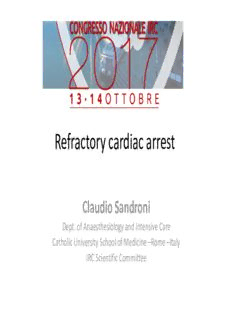
Refractory cardiac arrest PDF
Preview Refractory cardiac arrest
Refractory cardiac arrest Claudio Sandroni Dept. of Anaesthesiology and Intensive Care Catholic University School of Medicine –Rome –Italy IRC Scientific Committee Conflicts of interest None Cardiac arrest: how long should we treat? • When initial resuscitation efforts are unsuccessful, the team should decide if and how CPR should be continued • ERC Guidelines (2015) discontinuation criteria: – Ongoing advanced life support – Absence of reversible causes – Asystole > 20 min. CPR duration and neurological outcome n = 1014 Reynolds J et al. Circulation 2013; 128:2488-2494 However… n = 64,339 IHCAs 25% achieved ROSC >20 min 12% achieved ROSC >30 min. Goldberger ZD et al Lancet 2012; 380:1473–1481 Neurological outcome and CPR duration 100 90 80 70 60 <15 min 50 15-30 min 40 >30 min 30 20 10 0 Favourable neurological outcome, % Goldberger ZD et al Lancet 2012; 380:1473–1481 Factors for survival in refractory CA • Secondary analysis of the ROC-PRIMED trial – 11,368 OHCAs – 905 survived w/mRS ≤3 • Primary exposure: duration of resuscitation • Association tested with logistic regression models Reynolds J et al. Circulation. 2016;134:2084-2094 Results • Duration of resuscitation was independently associated with survival with good neurological outcome • The longest observed CPR duration with good neurological outcome was 47 minutes Reynolds J et al. Circulation. 2016;134:2084-2094 Reynolds J et al. Circulation. 2016;134:2084-2094 Reynolds J et al. Circulation. 2016;134:2084-2094
Description: